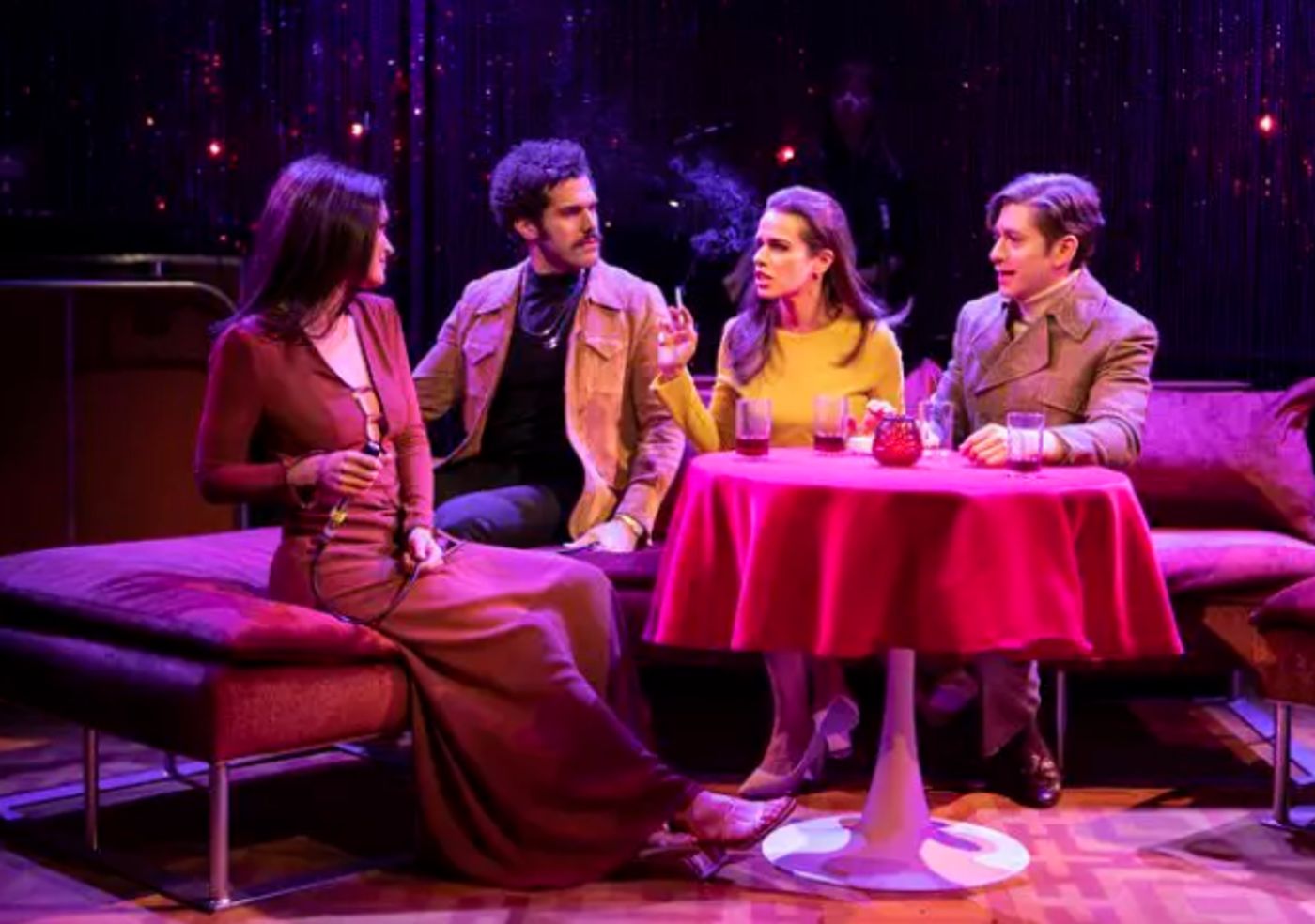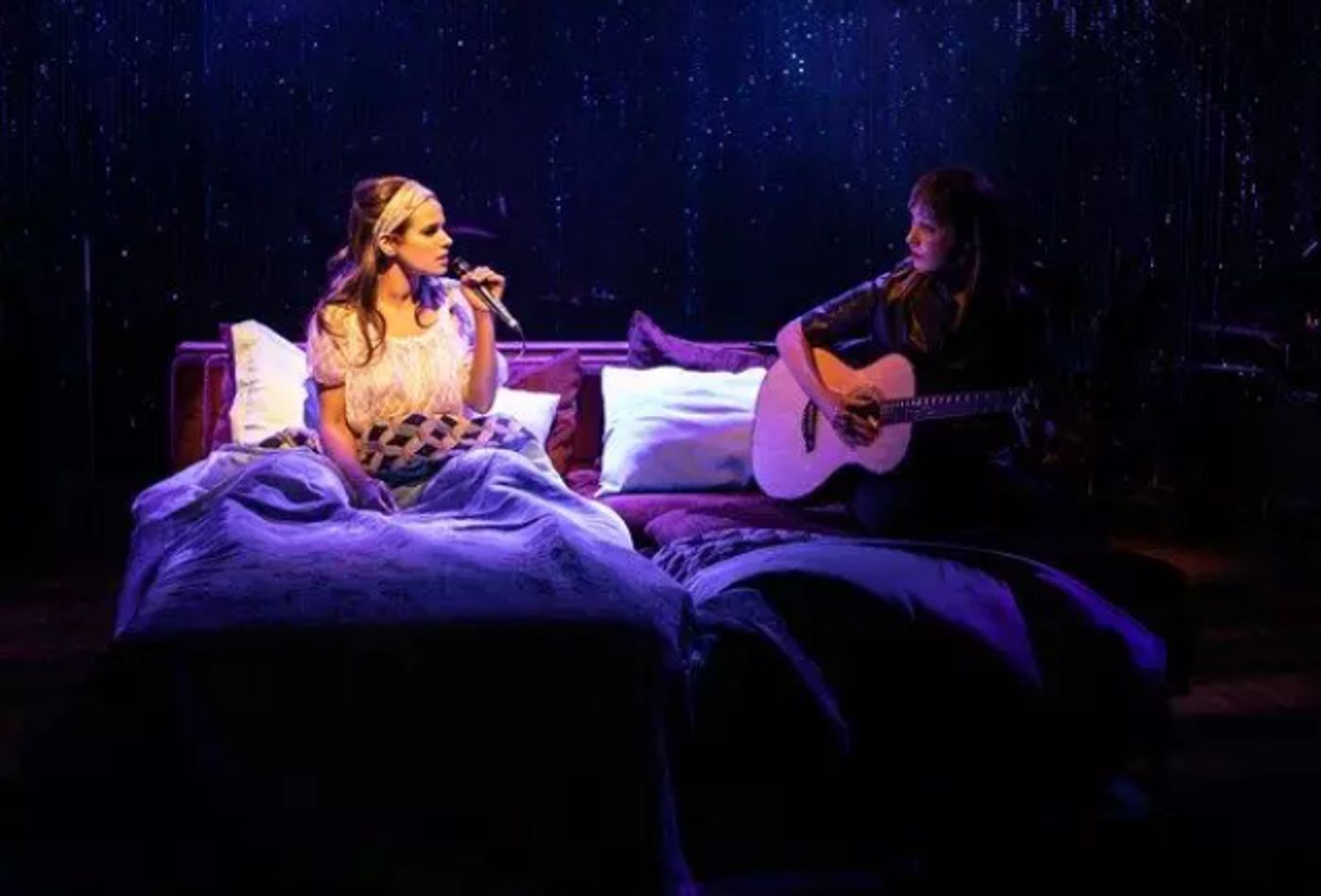Review: BOB & CAROL & TED & ALICE is Funny & Sweet & Sexy & Endearing
Duncan Sheik, Amanda Green and Jonathan Marc Sherman's new musical is based on Paul Mazursky's iconic sexual revolution film.
If the open hardcover copy of Thomas A. Harris, M.D.'s 1967 self-help bible "I'm OK - You're OK" casually placed upon an ottoman makes you chuckle a bit as you settle down for The New Group's latest endeavor, you're of a proper mindset to enjoy Duncan Sheik (music/lyrics), Amanda Green (lyrics) and Jonathan Marc Sherman's (book) sweet, funny and endearing new chamber musical BOB & CAROL & TED & ALICE.

and Michael Zegan (Photo: Monique Carboni)
With its catchy name and bright yellow cover, the good doctor's best-selling, easily digestible lessons on transactional analysis was arguably the most popular of the pop psychology volumes that stuffed its generation's bookshelves. And it was books like these, encouraging getting in touch with and communicating one's feelings, that helped fuel the mainstream outgrowth of the sexual revolution as the Swinging 60s began mellowing into The Me Decade of the 70s.
So when director Paul Mazursky introduced America to thirtysomething married couples Bob and Carol Sanders and Ted and Alice Henderson in his same-named hit 1969 film, it came at a time when media and pop culture were making young married suburbanites, raised on the revolution of rock and roll, wonder if they were growing stodgily into bland middle age.
Musical theatre fans will recognize the similarly to the 1977 Broadway hit I LOVE MY WIFE, but while Cy Coleman and Michael Stewart were aiming for punch lines with their story of two New Jersey couples considering a foursome, Mazursky was going for something deeper, perhaps wondering if American society was emotionally prepared to live out its sexual fantasies. And perhaps, as suggested by its closing moments played to Jackie DeShannon's recording of Burt Bacharach and Hal David's "What The World Needs Now Is Love", wannabe swingers were advised to first fully explore their capacity to love.
Naturally, half a century of evolving attitudes and a better understanding of normalcies that were once considered kinky and exotic to average Americans have altered the story's impact, so although Sheik, Green and Sherman stick close to the film's lightly satirical tone, there's an endearing innocence brought out in both the adaptation and director Scott Elliot's intimate production. When the proceedings get sexy, it's all done with cute playfulness and an eye towards mutual consent.
It all begins when documentary filmmaker Bob (Joél Pérez, strutting sensitive artist cockiness) and his wife Carol (Jennifer Damiano, suggesting traces of flower child openness) take a break from being parents for a weekend at "The Institute at Big Sur, home of the Human Potential Movement," where adventurous couples go to confront their fears, realize their potential and transform all their negativity into joy.
Though they both intend to just be flies on the wall observing, they really start getting into the casual nudity, trust exercises, primal screaming, Tai Chi classes, couples massage and the 24-hour group encounter therapy (for which audience members are brought in to dress the stage a bit).
So when, sometime later, Bob returns from a business trip and confesses that he had a one-night-stand with a woman he just met, both he and Carol are surprised to find that she feels okay about it, as long as it was just physical pleasure and not love.

(Photo: Monique Carboni)
It's such a relationship-changing moment that they happily tell their friends Ted (Michael Zegen as a button-down attorney) and Alice (a very funny turn by Ana Nogueira as a neurotically repressed housewife. The two women are identified in the script as housewives.), who are at first stunned by the couple's openness and then consider if their own relationship is lacking.
"I'm scared of joining in and terrified I'm missing out," they both sing.
After episodes of honesty, communicating, self-discovery and sex (both in and out of marriage), the four of them wind up in a Las Vegas hotel room with an extra-large bed and the inevitable seems upon us.
In devising a score for this nontraditional musical theatre topic, the creators seem to have been inspired by the show's cinematic roots, with most of the singing done in snippets, without any applause buttons, weaving in and out of the action, and often by characters not directly involved with a scene, the way a film might have a bit of a song supplying an atmospheric interlude for a silent moment. When characters involved in scenes sing directly, it's often done with a hand-held mic, as though they're stepping out of the moment.
Beloved Greenwich Village troubadour Suzanne Vega fronts music director Jason Hart's onstage band and acts as a sort of spiritual guru for the piece, singing soft-pop philosophy and playing various small roles, often by just speaking lines into her microphone.
The songs themselves frequently mimic the easy listening style of the era. Pretty, melodic and unobtrusive. Admittedly, lyrics like "We're moving through the atmosphere / Cutting through the thin veneer / Dropping out of the sad place / Cruising into outer space" are not going to win any Kleban Prizes, but Sheik and Green effectively copy those late 60s/early 70s pop poetics that often served as background music for the candlelight dinners enjoyed by with-it couples once the kids were asleep.
Reader Reviews
Powered by
|
Videos


